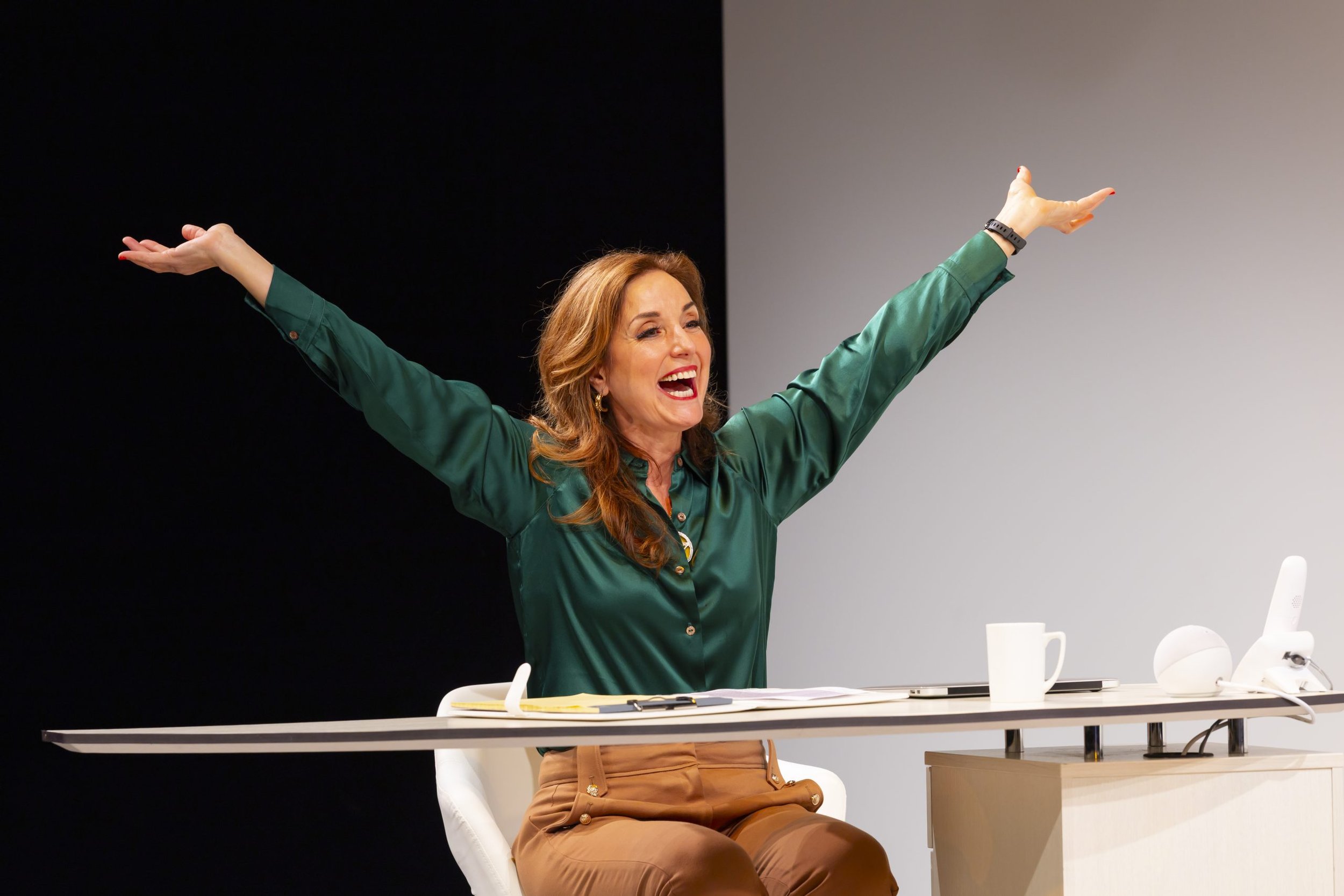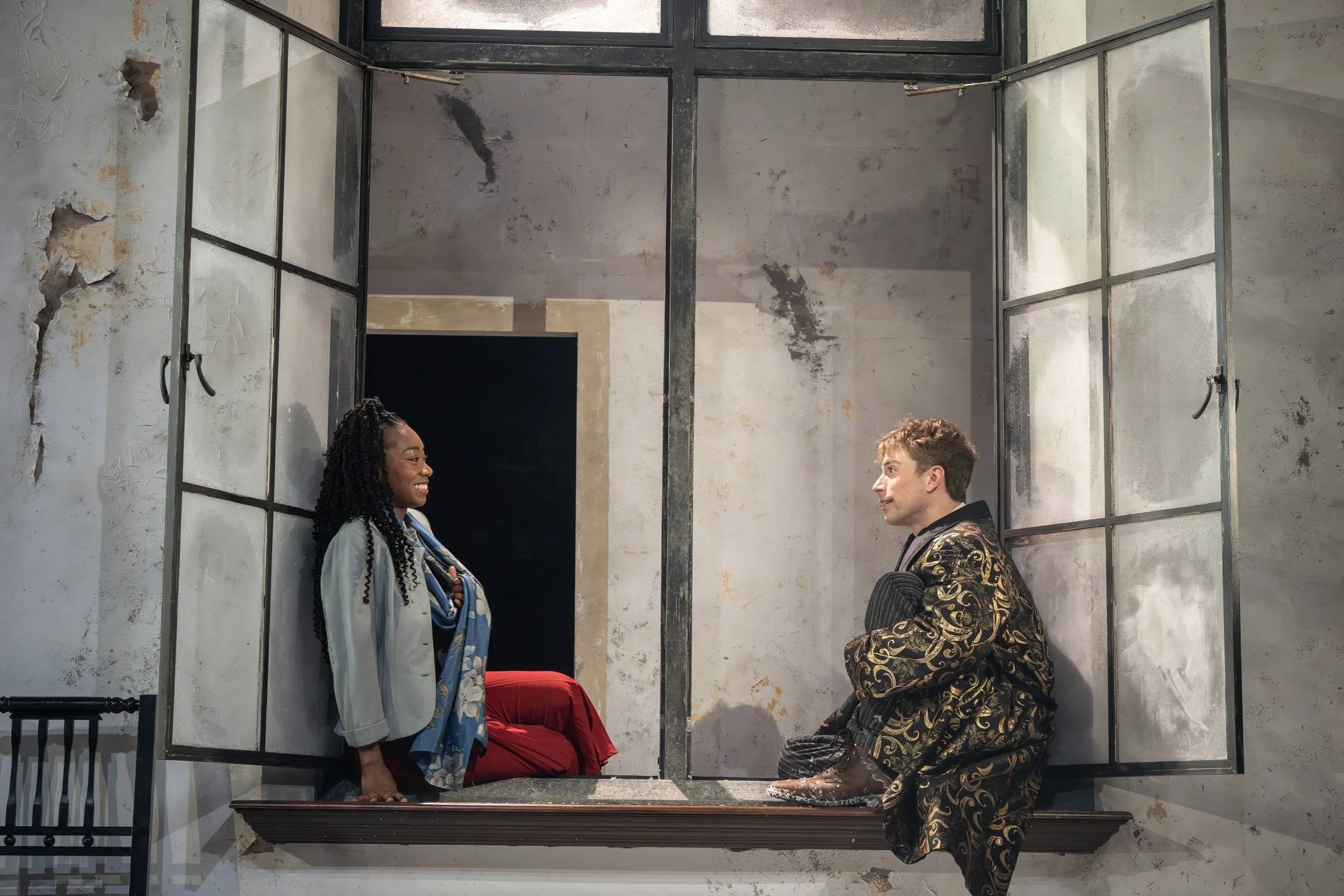Review of Theatre People, Westport Country Playhouse
What is the chief characteristic of “theatre people”? Paul Slade Smith’s play of that name, playing at Westport Country Playhouse through April 12, suggests that “theatre people” may often feel they’re in a play, so that life tends to be a matter of plots and subplots and complications that may lead to a happy ending (comedy) or an unhappy ending (tragedy). Cleverly playing on an awareness of life’s theatricality and of comic theater’s familiar tropes, Smith’s play, ably directed by Mark Shanahan, enacts the kind of fast-paced comedy that Westport Country Playhouse has a tradition of bringing off extremely well.
Margot (Mia PInero), Victor (Michael McCorry Rose), Olga (Erin Noel Grennan), Oliver (Rodolfo Soto), Arthur (Michael McCormick), Charlotte (Isabel Keating) in Theatre People, Westport Country Playhouse; photo by T. Charles Erickson
Visiting at a Rhode Island mansion to hear Broadway star Margot Bell (Mia Pinero) perform, Charlotte Sanders (Isabel Keating) and Arthur Sanders (Michael McCormick) are playwrights who hope to facilitate Margot’s participation in the play they plan to make of a new novel, The Angel in the Next Room (which, unbeknownst to Margot, has been written in dedication to her by Oliver Adams (Rodolfo Soto), a young writer in love with her). To help what the Sanderses assume to be a definite couple work together, Charlotte has arranged for Oliver to stay in a bedroom adjacent to Margot’s. Complications arise when Margot is overheard being not so angelic in the next room, much to Oliver’s dismay.
Oliver (Rodolfo Soto), Arthur (Michael McCormick), Charlotte (Isabel Keating) in Theatre People, Westport Country Playhouse; photo by T. Charles Erickson
The Sanders must rectify the situation, which means: dealing with Oliver’s despair (given several comical layers by Rodolfo Soto); enlightening Margot of the enormity of the situation (the Sanders desperately need a hit play), which causes Mia Pinero to move swiftly from grande dame to flustered ingenue; roping Oliver’s rival, the handsome, dashing and dim actor Victor Pratt (Michael McCorry Rose), into their plans—which means he may have to flap his arms like a showboating angel at some length; and enlisting all manner of help from Olga (Erin Noel Grennan), a scene-stealing and theater-deprecating housemaid who stands in at times for a playwright, a director, and an audience. The cast are all equal to their characters’ supposed real selves as well as the play-within-the-play characters they have to convince one another they understand (which is not easy!).
Charlotte Sanders (Isabel Keating), Margot Bell (Mia Pinero), Victor Pratt (Michael McCorry Rose) in Theatre People, Westport Country Playhouse; photo by T. Charles Erickson
Adapted from Ferenc Molnár’s Play at the Castle (1924), which was popularized in English by P. G. Wodehouse as The Play’s the Thing (1926), Theatre People is set in the 1940s, the chief era for Hollywood screwball comedies, with the Sanderses sometimes flinging off sallies worthy of Nick and Nora—Isabel Keating, who plays Charlotte with a fizzy, can-do assertiveness, even resembles Myrna Loy a little, especially when some of the fizz falls flat and she has to consider that intricate plots may be easier to pull off on stage than in life. As her often bemused, confused partner who lives his life rising to her bait, Michael McCormick shows off great timing, a skeptical foil who knows how to make the most of any opening given.
Charlotte Sanders (Isabel Keating), Arthur Sanders (Michael McCormick) in Theatre People, Westport Country Playhouse; photo by T. Charles Erickson
The romantic triangle that has to center the shenanigans is never as diverting as the fiction Charlotte devises so as to tie-up everyone’s loose ends, and Margot and Victor spend the whole first act on the other side of that well-appointed wall, while Oliver is the kind of unrealistically romantic naif whom one can’t imagine writing a novel much less a good one. Such devices make “theater people” seem rather silly, but the protracted “rehearsal” that, in Act 2, makes ridiculous theater of Victor’s wooing of Margot—and creates a preposterous plot that lets Arthur literally play God—is the pay-off, and even manages to make Olga a believer in the value of theater. The value certainly includes the ability to make everything—set (James J. Fenton), costumes (Annie J. Le), lighting (Alyssandra Docherty), sound (Jill BC Du Boff), props (Anya Kutner) and hair/makeup (J. Jared Janas) as top-notch and flawless as possible as they are here.
Olga (Erin Noel Grennan), Charlotte Sanders (Isabel Keating) in Theatre People, Westport Country Playhouse; photo by T. Charles Erickson
There’s a point fairly early in the play when Charlotte tries to explain theater’s attractions to a doubting Olga, whose common sense grasp of human foibles doesn’t see why anyone would want to waste time re-enacting such things. Charlotte describes how the audience at a play are able to forget the world and all its troubles while getting caught up in the lives being staged before them by living people. The words, we can imagine, are meant to have a resonance for our particular times, but can—we realize—be assigned to any time in human history. The power of theater to create a facsimile of life that can fascinate us, whether believable or unbelievable, laughable or lachrymose, keeps us returning to our seats. As the final entry in the venerable Westport Country Playhouse’s “Season of Laughter,” Theatre People capably reminds us that people who live only on stage need an audience to come alive. They need us, in other words, theater’s people.
Theatre People
By Paul Slade Smith
Adapted from Ferenc Molnár’s Play at the Castle
Directed by Mark Shanahan
Set Designer: James J. Fenton; Costume Designer: Annie J. Le; Lighting Designer: Alyssandra Docherty; Sound Designer: Jill BC Du Boff; Prop Supervisor: Anya Kutner; Wig, Hair, & Makeup Designer: J. Jared Janas; Production Stage Manager: Rebecca C. Monroe; Assistant Stage Manager: Christine Lemme; Production Assistant: Zach De Brino; Assistant Director: Anissa Felix
Cast: Erin Noel Grennan, Isabel Keating, Michael McCormick, Mia Pinero, Michael McCorry Rose, Rodolfo Soto
Westport Country Playhouse
March 25-April 12, 2025





































